
I’ve always had a soft spot for Marvel characters, but until recently, I hadn’t given much thought to Loki, the trickster god of mischief. That all changed when my oldest granddaughter told me that Loki is her absolute favorite. She and her mom are big fans of Tom Hiddleston, who brought Loki to life in the Marvel Cinematic Universe (MCU). They watch just about anything he’s in, which is saying something since Hiddleston has a pretty varied filmography! So, when my granddaughter asked me to write about her favorite Marvel personality, I figured it was time to dive into the evolution of Loki, both in the comics and on the big screen.
Loki’s journey from villain to anti-hero is one of the most compelling character arcs in the Marvel universe. He’s not just the God of Mischief; he’s a deeply flawed, yet relatable character, whose quest for identity and acceptance mirrors struggles that many of us face. In this post, we’re going to explore how Loki’s character has evolved over the years, from his early days in the comics to his current portrayal in the MCU. We’ll compare how his story unfolds differently in these two mediums, starting with his origins as a Frost Giant adopted by Odin, to his various schemes against Thor and the other gods, and ultimately, to his complex journey toward redemption.
This post contains affiliate links. If you make a purchase through these links, I may earn a commission at no extra cost to you.
The Birth of a Trickster: Loki’s Origins
To understand Loki, we need to start at the beginning—his birth and adoption, which set the stage for much of his inner turmoil. Loki’s roots, like many Marvel characters, are steeped in mythology, but with a Marvel twist.
Loki’s Mythological Roots: Loki is inspired by the Norse mythological figure of the same name, a trickster god who is often seen as both a helper and a hinderer to the gods of Asgard. In Norse mythology, Loki is a complex figure, capable of both great mischief and occasional acts of heroism, and it’s this duality that Marvel tapped into when creating their version of the character.
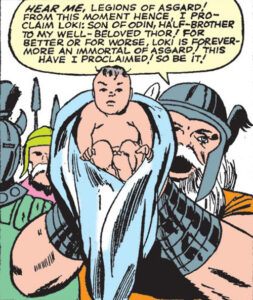 Loki’s Birth and Adoption in the Comics: In Marvel Comics, Loki was born as a Frost Giant, the son of Laufey, the king of the Frost Giants. Unlike the towering, fearsome giants of Jotunheim (pronounced as “YOH-tun-hime”), Loki was born small and weak, an embarrassment to his father. After a battle between the Frost Giants and the Asgardians, Odin, the All-Father of Asgard, discovered the infant Loki hidden away in a temple. Seeing potential in the child, Odin decided to adopt Loki and raise him as his own son, alongside his biological son, Thor.
Loki’s Birth and Adoption in the Comics: In Marvel Comics, Loki was born as a Frost Giant, the son of Laufey, the king of the Frost Giants. Unlike the towering, fearsome giants of Jotunheim (pronounced as “YOH-tun-hime”), Loki was born small and weak, an embarrassment to his father. After a battle between the Frost Giants and the Asgardians, Odin, the All-Father of Asgard, discovered the infant Loki hidden away in a temple. Seeing potential in the child, Odin decided to adopt Loki and raise him as his own son, alongside his biological son, Thor.
This decision would have far-reaching consequences. While Odin’s intentions were noble, Loki’s upbringing in Asgard was marked by a sense of alienation. Despite being raised as a prince of Asgard, Loki always felt like an outsider, especially when compared to his beloved brother Thor. This feeling of being “different” was exacerbated when Loki eventually discovered the truth about his origins.
Loki’s Discovery of His True Heritage: The revelation of Loki’s true heritage is a pivotal moment in his journey, both in the comics and the MCU, though the two versions handle it differently.
- Comics: Loki’s realization of his Frost Giant lineage is a gradual process. Throughout early stories, his sense of alienation and jealousy towards Thor grows, ultimately leading him to question his place in Asgard. One of the key moments occurs in Journey into Mystery #112 (Jan 1965), written by Stan Lee with art by Jack Kirby. Here, Loki’s growing resentment and desire for power start to take shape as he learns more about his past, fueling his descent into villainy.
- MCU: The MCU takes a more dramatic approach. In Thor (2011), directed by Kenneth Branagh, Loki learns the truth in a heart-wrenching scene where he confronts Odin about his origins. After touching the Casket of Ancient Winters, a relic of his people, Loki realizes that he is not Asgardian, but a Frost Giant. This revelation shatters Loki, leading him to question everything about his identity and place in the world. It’s a moment that profoundly impacts his character, setting him on a path of rebellion and destruction.
In both versions, Loki’s discovery of his true heritage plays a crucial role in shaping his identity. It’s this moment of betrayal—feeling that he was never truly one of the Asgardians—that drives much of his early villainy.
The Mischief Maker: Loki’s Villainous Activities
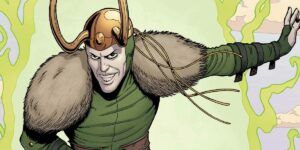
Loki’s transformation from a troubled prince to a full-fledged villain is marked by numerous schemes and plots, both in the comics and in the MCU. His early days as the God of Mischief are filled with elaborate tricks and manipulations, all designed to bring down his brother Thor and seize power for himself.
As an Amazon Associate, I earn from qualifying purchases.
Loki’s Early Villainy in the Comics: Loki’s villainous activities in the comics are numerous and varied, showcasing his cunning and his ability to manipulate others to achieve his goals.
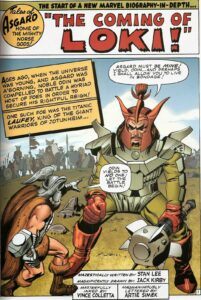 Tales of Asgard: Some of Loki’s earliest and most iconic stories are found in the Tales of Asgard backup feature, which ran in Journey into Mystery from #97 to #145 (Oct 1963 – Oct 1967). These stories, also written by Stan Lee and illustrated by Jack Kirby, delve into Loki’s childhood and his rivalry with Thor. One of the most memorable tales is in Journey into Mystery #115 (Apr 1965), where Loki conspires with the Storm Giants to defeat Thor. Although his plans are ultimately foiled, this issue is an excellent example of Loki’s knack for deceit and manipulation.
Tales of Asgard: Some of Loki’s earliest and most iconic stories are found in the Tales of Asgard backup feature, which ran in Journey into Mystery from #97 to #145 (Oct 1963 – Oct 1967). These stories, also written by Stan Lee and illustrated by Jack Kirby, delve into Loki’s childhood and his rivalry with Thor. One of the most memorable tales is in Journey into Mystery #115 (Apr 1965), where Loki conspires with the Storm Giants to defeat Thor. Although his plans are ultimately foiled, this issue is an excellent example of Loki’s knack for deceit and manipulation.- Collaborations with Villains: Loki didn’t work alone in his misdeeds. He often teamed up with other villains to achieve his ends. For instance, in Avengers #1 (Sept 1963), also by Stan Lee and Jack Kirby, Loki manipulates the Hulk into causing destruction, hoping to draw Thor into a fight. This plan inadvertently leads to the formation of the Avengers, a twist that highlights Loki’s ability to influence others, even when his schemes don’t go as planned.
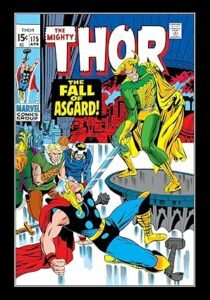 The Search for Power: Throughout the Silver and Bronze Ages of comics, Loki’s quest for power leads him to various schemes to overthrow Odin and claim the throne of Asgard. In Thor #175-177 (Apr-Jun 1970), written by Stan Lee with art by Jack Kirby, Loki finally achieves his goal of ruling Asgard by tricking Odin into exile. However, his rule is short-lived as he underestimates the responsibilities of leadership and the resistance of the Asgardians, including Thor.
The Search for Power: Throughout the Silver and Bronze Ages of comics, Loki’s quest for power leads him to various schemes to overthrow Odin and claim the throne of Asgard. In Thor #175-177 (Apr-Jun 1970), written by Stan Lee with art by Jack Kirby, Loki finally achieves his goal of ruling Asgard by tricking Odin into exile. However, his rule is short-lived as he underestimates the responsibilities of leadership and the resistance of the Asgardians, including Thor.
Loki’s Villainy in the MCU: Loki’s villainous activities are just as complex and compelling in the MCU, though they are often portrayed with a more personal touch, emphasizing his internal conflict and desire for acceptance.
- Thor (2011): Loki’s journey as a villain begins in Thor (2011), where his jealousy and feelings of inadequacy drive him to betray his brother and father. His plan to use the Destroyer to eliminate Thor and secure the throne of Asgard is a direct reflection of his deep-seated insecurities.
- The Avengers (2012): In The Avengers (2012), directed by Joss Whedon, Loki takes his villainy to new heights, becoming the primary antagonist. Here, he seeks to conquer Earth with the help of the Chitauri, under the guidance of Thanos. Loki’s manipulation of the Tesseract and his orchestration of the Battle of New York demonstrate his cunning and ambition, though his defeat also highlights his vulnerability.
- Comparison with Comics: When comparing Loki’s villainous activities in the comics with the MCU, one can see how the films focus more on Loki’s personal motivations—his need for validation from Odin and Thor—while the comics often emphasize his schemes for power and control. Both versions, however, showcase his intelligence, charisma, and ability to manipulate those around him.
The Path to Redemption: Loki’s Transition to Anti-Hero
Loki’s journey from villain to anti-hero is one of gradual evolution, marked by moments of introspection, loss, and a growing desire to be something more than just the God of Mischief. While the MCU uses the Time Variance Authority (TVA) to catalyze Loki’s transformation, the comics take a more complex and multi-faceted approach.
Loki’s Journey in the MCU:
- The TVA and Loki’s Evolution: Loki’s transformation in the MCU is closely tied to the events of the Loki series (2021). After being captured by the TVA following his escape in Avengers: Endgame (2019), Loki is forced to confront his past actions. The TVA shows him the life he would have lived if he hadn’t escaped, including his eventual death at the hands of Thanos in Avengers: Infinity War (2018). This experience is a turning point for Loki, leading him to question his choices and reconsider his identity.
- Key moments in the Loki series, such as his interactions with Mobius M. Mobius (played by Owen Wilson) and Sylvie (a variant of himself), further push Loki towards redemption. He begins to see the value in working with others, and his journey becomes less about power and more about understanding himself and his place in the multiverse.
Loki’s Evolution in the Comics:
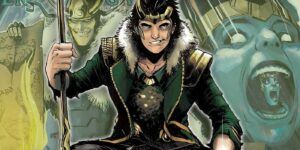
Journey Into Mystery Vol. 2 (2011-2012):
- Loki’s journey toward becoming an anti-hero in the comics is more nuanced and gradual than in the MCU. One of the key story arcs that showcase this evolution is the Journey Into Mystery series, which ran from 2011 to 2012, written by Kieron Gillen with art by Doug Braithwaite. This series follows a younger version of Loki, reborn after the events of Siege (2010), where he sacrifices himself to save Asgard. Reborn without the baggage of his past sins, this “Kid Loki” struggles with his identity and the expectations of those around him, including his brother Thor.
- Throughout this series, Loki is portrayed as a character seeking redemption, trying to prove that he can be more than the villain everyone expects him to be. However, his journey is fraught with challenges, as others are often suspicious of his intentions, and he is constantly tempted to revert to his old ways. The series is a deep exploration of identity, destiny, and the struggle between good and evil, all themes central to Loki’s character.
Agent of Asgard (2014-2015):
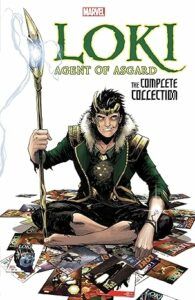 Another pivotal moment in Loki’s evolution occurs in the Loki: Agent of Asgard series, written by Al Ewing with art by Lee Garbett. This series takes place after the events of Journey Into Mystery, and it sees Loki taking on missions for the All-Mother in an attempt to atone for his past deeds. However, this version of Loki is haunted by his former self, the “God of Lies,” who constantly challenges his attempts to change.
Another pivotal moment in Loki’s evolution occurs in the Loki: Agent of Asgard series, written by Al Ewing with art by Lee Garbett. This series takes place after the events of Journey Into Mystery, and it sees Loki taking on missions for the All-Mother in an attempt to atone for his past deeds. However, this version of Loki is haunted by his former self, the “God of Lies,” who constantly challenges his attempts to change.- The series is notable for its exploration of Loki’s internal conflict, as he tries to break free from the cycle of villainy and become a true hero. However, Loki’s journey is complicated by the realization that he can never fully escape his past, leading to a complex and morally ambiguous character who is both relatable and deeply flawed.
- Comparison with the MCU:
- While the MCU uses the TVA as a catalyst for Loki’s redemption, the comics take a broader and more introspective approach. In the comics, Loki’s transformation is not the result of a single event but rather a long and difficult journey marked by self-reflection, loss, and the struggle to overcome his darker impulses. Both versions of Loki, however, ultimately seek the same thing: a chance to define themselves on their own terms, free from the expectations of others.
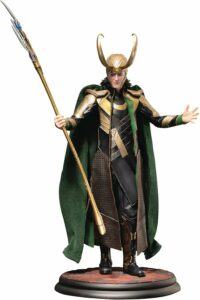
Loki’s Relationships: Thor, Odin, and Others
Loki’s relationships with other characters are central to his development, both as a villain and as an anti-hero. His complicated bond with Thor, his tumultuous relationship with Odin, and his interactions with other gods and mortals all play a role in shaping who he is.
Loki and Thor: Brothers and Rivals
In the Comics:
- Loki’s relationship with Thor is one of the most enduring and complex in Marvel Comics. From their early days in Journey into Mystery and Tales of Asgard, their bond has been defined by both brotherly love and deep-seated rivalry. Thor, the golden child of Asgard, represents everything Loki envies—strength, nobility, and the love of their father, Odin. Loki, on the other hand, is constantly seeking to prove himself, often through acts of deceit and manipulation.
- One of the most poignant examples of their relationship is found in Thor #367 (May 1986), written by Walt Simonson. In this issue, Loki and Thor are forced to team up to stop the villain Surtur from destroying Asgard. Despite their differences, the brothers work together, showcasing the deep, albeit strained, bond they share.
In the MCU:
- The MCU also delves into the complex relationship between Loki and Thor, emphasizing their deep connection despite Loki’s betrayal. In Thor: The Dark World (2013), directed by Alan Taylor, the two brothers must once again join forces to stop the Dark Elves. Although Loki initially uses the situation to further his own ends, his actions during the final battle reveal a more vulnerable side, hinting at the possibility of redemption.
- The culmination of their relationship is perhaps best seen in Thor: Ragnarok (2017), directed by Taika Waititi. Here, Loki finally steps out of his brother’s shadow, choosing to fight alongside Thor to save Asgard from destruction. This marks a significant turning point in Loki’s character arc, as he begins to embrace his role as a hero, albeit on his own terms.
Loki and Odin: Father and Son
In the Comics:
- Loki’s relationship with Odin is one of deep-seated resentment and a longing for approval. Odin, while caring for Loki, has always been more distant and less openly affectionate than he is with Thor. Loki’s feelings of inadequacy are only heightened when he discovers his true heritage as a Frost Giant. This strained relationship is explored in various comics, including Thor #368 (June 1986), where Loki confronts Odin about his place in Asgard and his desire for power.
- Odin’s harsh treatment of Loki, often justified as necessary for the greater good, is a recurring theme in the comics. Loki’s quest for power and recognition is often driven by his desire to prove himself to Odin, even if it means resorting to villainy.
In the MCU:
- The MCU also explores the complex dynamics between Loki and Odin. In Thor (2011), Loki’s feelings of betrayal upon learning the truth about his origins lead him to confront Odin, accusing him of favoritism towards Thor. This confrontation is a turning point for Loki, setting him on a path of rebellion and self-destruction.
- However, the relationship between Loki and Odin is not entirely negative. In Thor: Ragnarok, Odin’s final words to Loki are ones of encouragement, urging him to find his own path. This moment of reconciliation, though brief, has a profound impact on Loki, contributing to his eventual decision to fight alongside Thor.
Loki and Others: Allies and Enemies
Collaborations and Conflicts:
- Throughout his journey, Loki has had numerous interactions with other characters, both as allies and enemies. In the comics, Loki has often collaborated with other villains, such as the Enchantress (pictured above) and the Frost Giants, to further his schemes. However, these alliances are usually short-lived, as Loki’s true nature often leads to betrayal and double-crossing.
- In the MCU, Loki’s most notable alliance is with Thanos in The Avengers (2012), where he is tasked with conquering Earth in exchange for the Chitauri army. However, this partnership is also marked by deception, as Loki seeks to use Thanos’s power for his own ends.
Comparison with the Comics:
- The MCU often portrays Loki’s alliances as a means to an end, driven by his desire for power and recognition. In the comics, however, Loki’s collaborations are more complex, often motivated by a mixture of ambition, necessity, and a desire to prove himself.
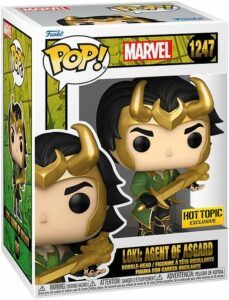
The Legacy of Loki: Villain, Anti-Hero, or Something More?
Loki’s journey from villain to anti-hero is one of the most fascinating and enduring character arcs in both Marvel Comics and the MCU. Whether driven by a desire for power, a need for acceptance, or a quest for identity, Loki is a character who constantly evolves, reflecting the complexities of human nature.
Loki’s Legacy in the Comics:
- Loki’s evolution in the comics is marked by his constant struggle to reconcile his darker impulses with his desire to be something more. From his early days as a villain seeking to overthrow Thor and Odin, to his later attempts at redemption in series like Journey Into Mystery and Agent of Asgard, Loki’s journey is one of growth and self-discovery.
Loki’s Legacy in the MCU:
- In the MCU, Loki’s transformation is more linear, driven by key events such as his time with the TVA and his relationship with Thor. However, the core of Loki’s character remains the same—a deeply flawed, yet relatable figure who is constantly striving to find his place in the world.
Villain, Anti-Hero, or Something More?
- Loki’s journey is not one of simple labels. He is a character who defies easy categorization, embodying both the qualities of a villain and those of a hero. In many ways, Loki’s evolution is a reflection of the complexities of the human experience—the struggle between good and evil, the desire for acceptance, and the quest for identity.
Would you like to know how Loki contributed to his own adoption by Odin? Check out this very eye-opening video from Comics Explained. Learn all about the Classic Loki.
Writing about Loki has been a journey in itself, much like the character’s evolution from villain to anti-hero. As someone who has watched my granddaughter’s love for Loki grow, I’ve come to appreciate the depth and complexity of this character, both in the comics and on the big screen. Loki is more than just the God of Mischief; he is a character who reflects the struggles and contradictions that define us all.
However, it’s essential to recognize that Loki’s choices, especially his villainous actions, are his own. While his circumstances, including his adoption, feelings of inadequacy, and desire for power, certainly influenced his decisions, the pain he inflicted and the lives he disrupted are his responsibility. Loki’s journey towards redemption doesn’t erase the harm he has caused; instead, it highlights the difficult path of owning one’s mistakes and striving to change.
Whether you’re a fan of the comics or the MCU, Loki’s story is one that resonates on many levels. His journey is a reminder that redemption is possible, even for those who seem beyond saving, but it must come with the acceptance of one’s past actions. As we continue to see Loki’s character evolve, both in comics and on screen, one thing is clear: the God of Mischief will always keep us guessing, and we wouldn’t want it any other way.
If you’ve enjoyed exploring Loki’s journey as much as I have, I’d love to hear your thoughts! What are your favorite Loki moments from the comics or the MCU? Share your stories in the comments below, and if you found this post insightful, please share it with your friends on your favorite social media platforms. Let’s keep the conversation about the God of Mischief going!
Here’s a reading list of essential comic issues for anyone looking to dive deeper into Loki’s story:
Essential Loki Reading List
- Journey into Mystery #85
-
- Writer: Stan Lee
- Artist: Jack Kirby
- Date: October 1962
- First appearance of Loki, setting the stage for his rivalry with Thor.
- Thor #154-157
-
- Writer: Stan Lee
- Artist: Jack Kirby
- Date: July-October 1968
- “The Origin of Loki” – These issues delve into Loki’s backstory, including his birth as a Frost Giant and adoption by Odin.
- Thor #175-177
-
- Writer: Stan Lee
- Artist: John Buscema
- Date: April-June 1970
- Loki’s quest for power and his betrayal of Asgard highlight his darker side.
- Thor #353
-
- Writer: Walt Simonson
- Artist: Walt Simonson
- Date: March 1985
- A key issue in Simonson’s legendary run, where Loki plays a pivotal role in the battle against Surtur.
- Journey into Mystery #622-645
-
- Writer: Kieron Gillen
- Artist: Doug Braithwaite, Richard Elson
- Date: April 2011 – October 2012
- The “Kid Loki” arc explores Loki’s rebirth and struggles with his identity, marking a turning point in his evolution.
- Loki: Agent of Asgard #1-17
-
- Writer: Al Ewing
- Artist: Lee Garbett
- Date: February 2014 – September 2015
- This series showcases Loki’s transformation into an anti-hero, as he tries to rewrite his destiny and atone for his past deeds.
- Vote Loki #1-4
-
- Writer: Christopher Hastings
- Artist: Langdon Foss
- Date: June-September 2016
- A fun and satirical take on Loki as he runs for President of the United States, blending mischief with modern politics.
- The Mighty Thor #700
-
- Writer: Jason Aaron
- Artist: Various
- Date: December 2017
- A milestone issue that includes Loki’s shifting role in the broader Marvel Universe.
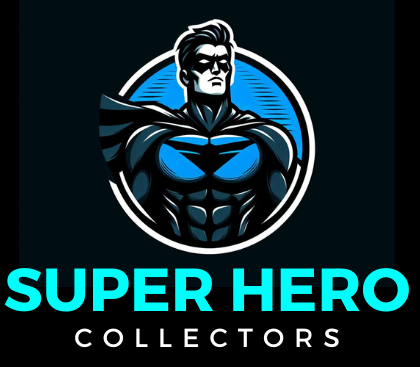
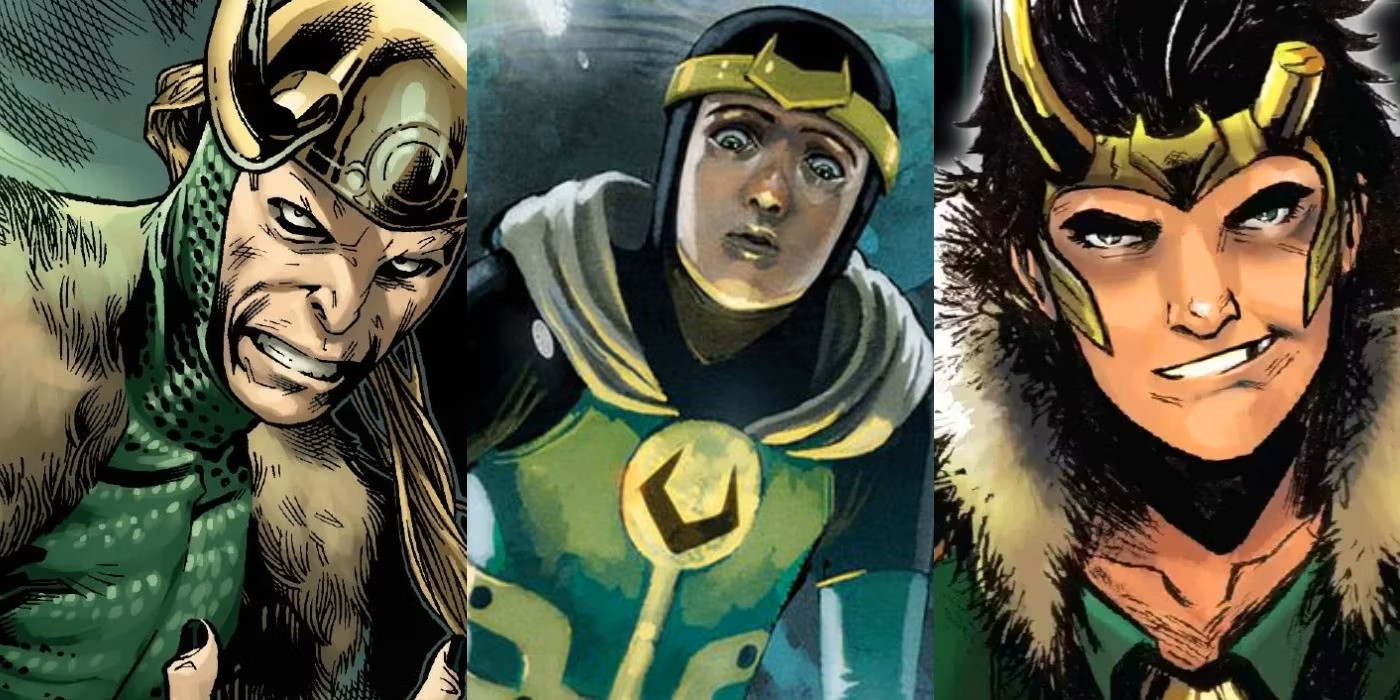
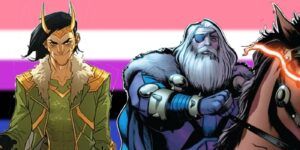
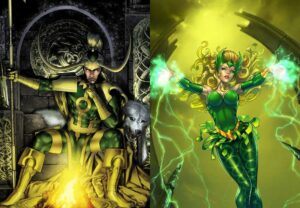
Thank you for your thorough review of the Loki character, in the the comics and the MCU. I have only known the character through watching the MCU movies, so learning about the character’s development from the comics was very informative. I feel that I understand more about Loki’s backstory and appreciate his evolution as a character from a villain to an anti-hero.
Hi Chris!
Thank you for your comment. I think many people know Marvel personalities just from watching the movies. The comics definitely dives deeper into the stories, so going back to the roots in the comics can help us getting a much better concept of each character.
Thank you for visiting and leaving a comment! Come back for more superhero content!
– Scott
I’ve always loved how Marvel weaves complex narratives with its characters, and Loki is a perfect example of that. His journey from villain to anti-hero feels so much more than just a typical redemption arc it’s deeply human, even though he’s a god. The internal struggles of identity, belonging, and purpose really resonate, especially with how Loki is portrayed differently in the comics versus the MCU. You captured that perfectly!
Hi Kavitha!
Welcome back and thank you for leaving a comment!
– Scott
This is an intriguing article, in my opinion, the evolution of Loki from villain to anti-hero is a fascinating journey that adds depth to his character. Starting as a complex antagonist driven by envy and a desire for power, Loki’s growth into an anti-hero reflects his struggle with identity, redemption, and the need for belonging. This transformation makes him one of the most compelling characters in the Marvel universe, showing that even the most flawed individuals can change and find a path to redemption. His arc challenges the traditional boundaries of good and evil, making his story relatable and intriguing. Thanks
Hi!
Thanks for taking time to leave a comment! Please check out my other posts and come back for more superhero fun!
– Scott
I just finished reading your article on Loki’s evolution from villain to anti-hero, and I have to say, it was a fascinating journey to follow! The way you’ve detailed Loki’s transformation over time—from his early days as a formidable antagonist to his complex role as an anti-hero—is truly insightful.
I particularly appreciated how you highlighted the nuances in Loki’s character development. It’s intriguing to see how his motivations and actions have evolved, reflecting his internal struggles and growth. Your analysis of key moments, such as his interactions with Thor and his role in the MCU, really brings out the depth of his character.
The discussion on how Loki’s portrayal has shifted in response to fan reception and changing storytelling trends was also very enlightening. It’s impressive to see how a character initially set up as a villain can become so beloved and multi-dimensional, bridging the gap between hero and villain.
Your article does an excellent job of showcasing Loki’s journey and the creative decisions that have shaped his character. Thanks for such a compelling and well-researched piece!
Thank you so much, Frank! I’m thrilled that you found the article on Loki’s evolution as engaging as I hoped it would be. Loki’s transformation from a pure antagonist to a richly layered anti-hero is one of the most fascinating character arcs in Marvel, and it’s always rewarding to dive into those complexities.
I’m glad you appreciated the focus on the nuances of his development, especially his internal struggles and the shifting motivations that have made him such a compelling character. His interactions with Thor and the ways these have influenced his journey are central to understanding Loki’s evolution, so it’s great to hear that this resonated with you.
The impact of fan reception and storytelling trends on Loki’s portrayal is indeed an interesting aspect, and it’s a testament to how dynamic and responsive storytelling can be. Seeing a character like Loki grow into such a beloved figure really speaks to the power of narrative and character development.
Thanks again for your kind words and for taking the time to share your thoughts! I’d love to hear your favorite Loki moment—whether from the comics, the MCU, or elsewhere. Feel free to share in the comments, and if you enjoyed the post, don’t hesitate to share it with others who might be just as intrigued by Loki’s journey.
Please come back for more superhero fun! And please share with the post with your friends on social media!
– Scott
This article provides an insightful look into Loki’s transformation from a villain to an anti-hero, capturing the complexity of his character arc over time. The way Loki’s journey has been portrayed, especially in the MCU, really highlights the fine line between good and evil. It makes me wonder how much of his evolution was planned from the beginning versus how much was shaped by fan reactions and the broader narrative developments. Do you think Loki’s character arc has reached its peak, or could we see further growth or even regression in future installments? This piece has definitely deepened my appreciation for his character!
Hi Aris,
Thank you so much for your thoughtful comment! I’m glad you found the article insightful and that it deepened your appreciation for Loki’s character.
Regarding your question about Loki’s evolution, it’s a fascinating topic. From the beginning, Loki’s character arc was designed to be complex and multifaceted. However, as with many characters, fan reactions and broader narrative developments have significantly influenced his journey. The writers and creators have skillfully adapted Loki’s evolution in response to audience feedback and shifting storylines, which is part of what makes his arc so compelling.
As for whether Loki’s character arc has reached its peak, it’s hard to say definitively. Characters in the Marvel Universe often experience further growth or regression based on new storylines and creative directions. Given Loki’s nature and the ongoing interest in his character, there’s always potential for new developments that could deepen or alter his journey. As for Tom Hiddleston’s part in playing the trickster in movies and TV, I recently saw headline that he is saying good-bye to Loki after over a decade.
I’m excited to see where Loki’s story goes next and how future installments might continue to explore his complexity. Thanks again for engaging with the post and sharing your thoughts!
Best,
Scott
This is quite a deep dive into Loki and by extension the Comics and MCU. This is a great read.
How do you think Loki’s rivalry with Thor influences his actions and decisions throughout the Marvel Comics series? Are there specific moments that highlight this dynamic?”
Also, I agree with your family, Tom Hiddleston is awesome!
Thank you, Dee! I’m glad you enjoyed the deep dive into Loki’s character across the comics and the MCU.
Loki’s rivalry with Thor is one of the most defining aspects of his character. It drives many of his actions and decisions, often out of a deep-seated need for validation and recognition, especially in comparison to Thor. This dynamic is vividly illustrated in the classic Journey into Mystery comics where Loki’s jealousy fuels his schemes against Thor, such as when he manipulates events to pit Thor against the Hulk, leading to the formation of the Avengers. Another significant moment is in the Thor storyline “The Surtur Saga,” where despite their rivalry, Loki chooses to aid Thor in defending Asgard against Surtur, highlighting the complex bond between them.
In the MCU, Loki’s jealousy and feelings of inadequacy are clear in Thor (2011) when he learns of his true heritage. His actions throughout the film are driven by a desire to prove himself as Thor’s equal or better, which ultimately leads to his downfall. Despite this, their bond is shown to persist, as seen in Thor: Ragnarok when Loki ultimately stands with Thor to save Asgard, showcasing his growth.
And yes, Tom Hiddleston’s portrayal of Loki is truly fantastic—he captures the essence of Loki’s complexity so well that it’s hard not to root for him!
Thanks again for your comment. What are your thoughts on Loki and Thor’s dynamic?
– Scott
The way you broke down the character development across the movies and shows was spot on. I especially appreciated how you highlighted his complex relationship with Thor—it’s one of my favorite aspects of his story. Do you think we’ll see more of this growth in future Marvel projects? Also, I’m curious, which version of Loki do you think is the most interesting? I’m torn between the mischievous villain and the more conflicted anti-hero!
Hi Bob,
Thanks so much for your thoughtful comment! I’m glad you enjoyed the breakdown of Loki’s character development—his relationship with Thor is indeed one of the most compelling aspects of his journey. As for future Marvel projects, I think we’ll definitely see more of Loki’s growth in the comics. I’m not so sure about the MCU. I have seen headlines that Tom Hiddleston is retiring from Loki after over a decade. If the MCU continues with any Loki stories, it will be without him.
As for your question, it’s a tough call! The mischievous villain version of Loki is undeniably fun to watch—he brings that chaotic energy that keeps everyone on their toes. But the conflicted anti-hero Loki really adds depth to his character, showing us that he’s more than just a trickster; he’s someone who wrestles with his identity and the consequences of his actions. If I had to choose, I’d say the anti-hero Loki is the most interesting, because it reflects his growth and the layers to his character that make him so relatable.
I’d love to hear more about which version of Loki you’re leaning toward—feel free to share your thoughts!
– Scott
What a great read! Loki is such a fascinating character with a lot of depth, and it’s awesome to see how his story has evolved from the comics to the MCU. I totally agree that his journey from villain to anti-hero is one of the most compelling arcs in the Marvel universe. It’s also cool to hear about your granddaughter’s love for Loki—it shows how these characters can resonate with different generations.
Hi Randi!
Thanks for reading and I’m thrilled you enjoyed the read. It was fun to put together.
If you have any questions about Loki or a suggestion for a writing topic, please let me know!
Come back for more superhero fun and please share my post on social media!
– Scott
I loved this deep dive into Loki’s character evolution! It’s fascinating to see how the God of Mischief has transformed from a classic villain into a more complex anti-hero. Your analysis really brings out the nuances of his journey in both the comics and the MCU.
I’m curious, what do you think triggered Loki’s shift from villain to anti-hero? Was it more about his internal struggles or his relationships with others? Which version of Loki do you find more compelling—the mischievous villain or the conflicted anti-hero? How do you think Loki’s redemption arc compares to other villains-turned-heroes in the Marvel universe? Do you believe Loki’s transformation is complete, or could he revert to his villainous ways?
Great job on the article—I’d love to hear your thoughts on these!
Best,
Gabriel John
Hi Gabriel John,
Thank you so much for your thoughtful comment! I’m glad you enjoyed the deep dive into Loki’s evolution. The complexity of Loki’s character is one of the reasons he’s become such a beloved figure in both the comics and the MCU.
As for what triggered Loki’s shift from villain to anti-hero, I think it’s a combination of his internal struggles and his relationships with others, especially Thor. Loki’s journey is deeply rooted in his sense of identity and belonging—or rather, his lack of it. His internal conflict over being an adopted Frost Giant, always feeling like the “other” in Asgard, plays a significant role in his evolution. But it’s his relationships, particularly with Thor, that push him to reconsider his path. Thor’s unwavering belief in Loki, despite all his betrayals, plants the seeds for Loki’s transformation.
When comparing the mischievous villain to the conflicted anti-hero, I find the latter more compelling. The anti-hero version of Loki allows for a richer exploration of his character. He’s not just driven by envy or the desire for power; he’s grappling with questions of identity, purpose, and redemption. This depth makes his journey more relatable and human, despite his godly status.
Loki’s redemption arc stands out in the Marvel universe because it’s filled with ambiguity. Unlike some villains-turned-heroes who have a clear-cut change of heart, Loki’s path is more convoluted. He doesn’t fully reject his mischievous nature, and that’s what makes his arc so fascinating. As for whether his transformation is complete—I think that’s one of the great questions about Loki. He’s inherently unpredictable, and that’s part of his charm. While he has shown significant growth, there’s always the possibility of him reverting to his old ways, especially when his back is against the wall.
Thanks again for engaging with the article, Gabriel! I’d love to hear your thoughts on which version of Loki you find more compelling. Feel free to share your favorite Loki moments from the comics or MCU as well!
Best,
Scott
4o
It’s funny to see that many comics characters were inspired by mythology! So, I’m not slightly surprised to see that Loki was inspired by a Norse God…However, I also believe that his journey from villain to anti-hero is a kind of initiation…He discovers his lineage, then he become a villain, and afterwards he seeks the redemption…I’ve always seen this path in many tortured heroes like Batman!
Welcome back! Thanks for your insightful comment! You’re absolutely right—Loki’s evolution from villain to anti-hero is very much like an initiation or a rite of passage. His journey, rooted in both Norse mythology and the rich storytelling of Marvel, mirrors the struggles of many characters who grapple with their identity and the consequences of their actions.
Keep coming back for more superhero fun! And if you can, please share my post on social media!
– Scott
What a fantastic exploration of Loki’s complex journey! You’ve done an incredible job capturing the essence of the God of Mischief, showing how his evolution from a villain to an anti-hero resonates with so many of us. Your analysis is both insightful and engaging, and I love how you’ve woven together the different facets of Loki’s character from both the comics and the MCU. It’s clear that you’ve put a lot of thought into this piece, and it’s no wonder your granddaughter is a fan—this post is a true tribute to the depth and richness of Loki’s character. Keep up the great work, Scott!
Hi!
Thank you for your kind words! I enjoyed putting this piece together. If you ever have a topic that you want me to explore, please let me know. If you have a chance, I would greatly appreciate if you could share the post on your social media!
– Scott
Scott,
This was a fascinating deep dive into Loki’s character evolution! It’s interesting how Loki’s journey from villain to anti-hero resonates with so many people, especially given his complex background and relatable struggles. I’m curious, in your opinion, which aspect of Loki’s transformation was the most significant in shaping him as an anti-hero? Do you think the MCU’s portrayal captured his internal conflict better than the comics, or do the comics offer a deeper insight? Also, how do you feel about Loki’s relationship with Thor—do you see their bond as a central factor in his evolution? I’d love to hear your thoughts on these questions, as they could spark some engaging discussions among readers!
Thanks again for the detailed analysis—looking forward to your response.
God bless, Amen.
Opa
Hi Opa,
Thank you so much for your thoughtful comment! I’m glad you enjoyed the deep dive into Loki’s evolution. You’ve raised some excellent questions that really get to the heart of what makes Loki such a compelling character.
In my opinion, the most significant aspect of Loki’s transformation into an anti-hero is his gradual shift in self-perception. Early on, Loki sees himself as a villain, driven by a desire for power and recognition. However, as his story progresses, particularly in the MCU, we see him grappling with his identity and past actions, leading to moments of genuine self-reflection. This internal struggle, where Loki begins to question whether he truly wants to be the villain he’s been cast as, is a turning point that deeply shapes his journey toward becoming an anti-hero.
As for the portrayal of Loki’s internal conflict, I think both the MCU and the comics have their strengths. The MCU does an excellent job of visually and emotionally conveying Loki’s turmoil, particularly through Tom Hiddleston’s performance, which captures the nuances of Loki’s vulnerability and growth. The comics, however, offer a deeper exploration of Loki’s complex psyche, often delving into his motivations and the mythological roots of his character. This allows for a richer understanding of why Loki makes the choices he does, though the cinematic portrayal has certainly brought those complexities to life for a broader audience.
Regarding Loki’s relationship with Thor, I absolutely see their bond as central to his evolution. Their dynamic is one of the most important factors in Loki’s story. Thor’s unwavering belief in Loki, despite all their conflicts, forces Loki to confront his own feelings of inadequacy and jealousy. Over time, this bond becomes a source of both pain and redemption for Loki, pushing him to reconsider his role not just as Thor’s antagonist but as his brother, which is crucial to his development into an anti-hero.
I’m glad you brought up these points, as they are great topics for further discussion. I’d love to hear what other readers think about Loki’s evolution, and I encourage everyone to share their thoughts!
Thanks again for your kind words, Opa. Looking forward to continuing the conversation.
If you have an aspect of Loki’s story that you would like for me to explore in a future post, please let me know!
If you can, please share my post on social media to bring more people into the discussion.
– Scott
Hi Scott
Your article on the evolution of Loki from villain to anti-hero offers a captivating exploration of the character’s transformation across various media, from comics to the MCU. It effectively highlights how Loki’s complex personality and moral ambiguity have resonated with audiences, making him one of the most compelling figures in the superhero genre. The detailed analysis of his journey from a mere antagonist to a character with depth and relatability is both insightful and engaging.
As Loki continues to evolve, what do you think might be the next step in his character development?
Hi Troy,
Thanks for your thoughtful comment! I’m glad you enjoyed the exploration of Loki’s journey from villain to anti-hero. His transformation has indeed captivated fans across both comics and the MCU, and it’s fascinating to see how his complexity adds so much to the superhero genre.
As for the next step in Loki’s character development, I believe we might see him continue to grapple with his identity and purpose. Given his history of straddling the line between good and evil, Loki could evolve further into a mentor or even a protector figure, perhaps guiding other characters who face similar moral dilemmas. Alternatively, the trickster in him might still lead him down unexpected paths, keeping his story as unpredictable and dynamic as ever. I’m curious to see if Marvel will explore deeper themes of redemption and identity in his future arcs. This is all speculation, of course. Marvel often surprises us.
What are your thoughts on where Loki’s journey might take him next? I’d love to hear your perspective!
Thanks again for your comment, and I look forward to hearing more from you.
Best,
Scott
Loki’s evolution from villain to anti-hero is truly fascinating, reflecting his complex character development across both comics and the MCU. It’s impressive how the MCU portrays his journey through the TVA, providing a deep look into his struggles and growth. Meanwhile, the comics offer a more nuanced take with stories like “Journey Into Mystery” and “Agent of Asgard,” showing Loki’s internal conflict and quest for redemption.
Both mediums highlight his transformation, but it’s clear that Loki’s path to becoming a hero is marked by both personal struggle and a desire to redefine himself. What do you think about Loki’s portrayal in these different formats?
Thank you, Maksim, for your thoughtful comment! You’ve perfectly captured the essence of Loki’s journey—both in the MCU and the comics. His evolution is indeed a remarkable blend of internal conflict, personal growth, and the ongoing struggle to redefine himself. The MCU’s portrayal through the TVA storyline does a great job of adding new layers to his character, showing us a Loki who is grappling with the consequences of his actions and trying to break free from his predetermined role.
In the comics, stories like “Journey Into Mystery” and “Agent of Asgard” delve even deeper into Loki’s psyche, revealing his internal battles and the weight of his past decisions. These narratives allow us to see a more introspective Loki, one who is not just seeking redemption but also understanding himself on a much deeper level.
I find that both mediums complement each other beautifully. The MCU gives us a broader, more cinematic view of Loki’s evolution, while the comics offer a more intimate and nuanced exploration of his character. It’s this duality that makes Loki such a compelling figure. His path to heroism, though fraught with challenges, is a testament to his resilience and the complexity of his character.
What about you? Do you find one medium’s portrayal of Loki more compelling than the other? I’d love to hear your thoughts!
I hope you come back for more superhero fun!
– Scott
Scott,
This article is a fantastic deep dive into the complex and multifaceted character of Loki. I truly appreciate how you’ve explored his evolution from a mischievous villain to a nuanced anti-hero across both the comics and the MCU. The detailed comparisons between his portrayals highlight the rich storytelling and character development that make Loki so compelling. I also loved the personal touch of connecting your granddaughter’s admiration for Loki to your exploration of his character—it adds a heartfelt dimension to the piece. The inclusion of the essential reading list is a great resource for fans looking to delve deeper into Loki’s lore. Overall, this article not only celebrates Loki’s enduring legacy but also underscores the timeless themes of identity, redemption, and the complexities of familial relationships. Bravo Well done!
Best Regards
Hi Eric,
Thank you so much for your thoughtful and encouraging comment! I’m thrilled that you enjoyed the deep dive into Loki’s evolution. He’s such a fascinating character with layers that make him endlessly intriguing, and it’s always rewarding to explore those complexities. I’m especially glad you appreciated the personal connection to my granddaughter—Loki has a way of resonating across generations, and that personal touch felt important to include.
I’m also happy to hear that you found the essential reading list useful. Loki’s journey through both the comics and the MCU is rich with moments that capture the essence of his character, and it’s great to know that readers like you are eager to dive deeper into his lore.
Your words about the themes of identity, redemption, and familial relationships are spot on—they’re exactly what make Loki’s story so powerful and enduring. Thank you again for taking the time to share your thoughts, and for your kind words.
Keep coming back for more superhero fun. And if you have an a topic you would like for me to explore, please let me know!
Scott
I loved reading about Loki’s journey from a classic villain to a complex anti-hero! It’s amazing how his character has evolved, showing so many layers beyond his mischievous side. I find it particularly compelling how his personal struggles and moments of redemption make him so relatable.
How do you think Loki’s character development will impact his role in future MCU projects? Can’t wait to see where his story goes next!
Hi Marlinda,
Thank you for adding to the discussion. I’m thrilled that you loved reading about Loki.
There probably won’t be much more development of his character in the MCU as the Loki series is ending at the conclusion of season 2. There is always the possibility that we will see more adventures with Loki in future comic issues.
Please come back for more superhero fun!
– Scott
Thank you for such a comprehensive exploration of Loki’s evolution from villain to anti-hero.
It’s fascinating to see how this character has developed over the years, both in the comics and in the MCU. I’ve always been intrigued by characters who aren’t easily categorized as purely good or evil, and Loki embodies that complexity so well.
His journey is a powerful reminder of how our circumstances shape us, but ultimately, it’s our choices that define who we are.
One aspect that really stood out to me was the comparison between how Loki’s villainy and redemption are handled in the comics versus the MCU.
The MCU seems to emphasize Loki’s internal struggles and his desire for validation from Odin and Thor, while the comics delve deeper into his broader quest for power and identity.
Do you think one medium captures Loki’s essence better than the other, or do they complement each other in portraying his multifaceted character?
I’m also curious about your thoughts on Loki’s relationships, particularly with Thor and Odin. These relationships are central to his development, but they are also sources of deep pain and conflict for him.
How do you think these relationships have influenced his transformation over time, especially in his journey towards redemption?
Lastly, the discussion on Loki’s legacy was particularly thought-provoking.
As someone who has followed both the comics and the MCU, do you think Loki’s journey towards redemption is complete, or is it still ongoing? How do you see his character evolving in future Marvel stories?
I’d love to hear your take on these questions, and I look forward to seeing how Loki’s story continues to unfold. Thanks again for such an insightful post!
Hi Raymond,
Thank you so much for your thoughtful and engaging comment! I’m glad you enjoyed the exploration of Loki’s evolution, and you’ve raised some really intriguing points that are at the heart of why Loki is such a captivating character.
You’re absolutely right that Loki embodies the complexity of characters who resist easy categorization. His journey, marked by both villainy and moments of redemption, really does reflect the idea that while our circumstances can shape us, it’s ultimately our choices that define who we are. This makes Loki’s character not just compelling, but also deeply relatable on a human level.
When it comes to how Loki’s essence is captured in the comics versus the MCU, I think both mediums bring something unique to the table. The MCU’s emphasis on Loki’s internal struggles and his complicated relationship with Odin and Thor adds a layer of emotional depth that resonates with many viewers. The comics, on the other hand, offer a broader canvas for exploring Loki’s quest for power and identity, diving into mythological elements and complex plotlines that aren’t always feasible in film. In many ways, they complement each other—while the MCU might give us a more intimate view of Loki’s personal struggles, the comics allow us to see the full spectrum of his ambitions and the intricate web of his character development.
As for Loki’s relationships with Thor and Odin, they are indeed central to his development. These relationships are a source of both deep pain and motivation for Loki, driving much of his early villainy as well as his eventual path towards redemption. Thor represents both a rival and a symbol of what Loki feels he can never truly attain—unconditional love and acceptance. Odin’s complicated legacy as a father figure adds another layer of conflict, as Loki grapples with feelings of inadequacy and betrayal. Over time, these relationships have forced Loki to confront his own identity and choices, pushing him toward moments of growth and self-reflection.
Regarding Loki’s journey towards redemption, I believe it’s still ongoing. His story is one of constant evolution, and while he has certainly made strides toward redemption, particularly in the MCU, there’s always the possibility for further development and challenges that could redefine his path. Loki’s character is dynamic and ever-changing, and I’m excited to see how future Marvel stories will continue to explore his multifaceted nature. It is doubtful that we will see Loki in the MCU in the near future. Tom Hiddleston has indicated that after 14 years in the MCU, he will be hanging up the Loki costume. Loki season 2 will be the finale of the series.
I really appreciate your insightful questions, and I’m glad you found the discussion on Loki’s legacy thought-provoking. It’s fans like you who make diving deep into these characters so rewarding. I’m also looking forward to seeing where Loki’s story takes us next!
Thanks again for sharing your thoughts, and I hope you continue to enjoy following Loki’s journey as much as I do!
Loki’s evolution from a villain to an anti-hero is one of the most compelling character arcs in modern storytelling. Initially introduced as a cunning and power-hungry antagonist in the Thor and Avengers films, Loki’s character was defined by his deep-seated jealousy, insecurities, and desire for recognition. However, as the Marvel Cinematic Universe (MCU) progressed, so did Loki’s character. His transformation into an anti-hero began when the complexity of his motivations was explored, revealing a deeply conflicted individual torn between his darker impulses and a desire for redemption.
Through key events—such as his strained relationship with his brother Thor, his realization of his own vulnerability, and moments of unexpected heroism—Loki gradually evolved. The character’s journey was further enriched by his wit, charm, and the emotional depth brought to life by Tom Hiddleston’s performance, making him one of the most beloved characters in the MCU.
The Disney+ series Loki was a turning point, cementing his anti-hero status by delving into his inner turmoil and showing him grappling with the consequences of his actions. It allowed viewers to see Loki not just as a trickster god, but as a multi-dimensional character capable of growth, empathy, and even self-sacrifice. This evolution has made Loki a nuanced figure who defies the traditional villain archetype, embodying the complexities of human nature and the potential for change.
HI Christian!
Thank you for adding to the discussion! I hope you enjoyed the post.
Please come back soon for more superhero fun!
– Scott
I always learn something new about Marvel characters when I visit your website. And this post on Loki, the trickster god of mischief, and his evolution from villain to anti-hero, is no exception.
It is very interesting to learn that the comics and the MCU, handle the revelation of Loki’s true heritage, in two diverse ways. If this was such a pivotal moment in Loki’s journey, why did the two not handle it in similar ways?
The evolution of Loki is complex in itself, so would it not be easier for followers to have the same interpretation in the comics as in the MCU? Thank you for clarifying.
Thank you, LineCowley, for your thoughtful comment and for being such a dedicated reader of my blog! I’m glad you found the post on Loki’s evolution enlightening.
The differences in how Loki’s true heritage is revealed in the comics versus the MCU are definitely interesting, but they’re not out of the ordinary when it comes to Marvel adaptations. The MCU often makes changes to characters’ backstories or relationships to fit the cinematic narrative better. For example, in the comics, Thor has an alter ego named Donald Blake, a key part of his story, but the MCU chose to leave that out entirely. Similarly, Peter Quill is the son of Ego in the MCU, while in the comics, his father is actually J’son of Spartax. And for Shang-Chi, the MCU reimagined his father as the Mandarin, while in the comics, he’s the son of Fu Manchu.
These adjustments allow the MCU to streamline and sometimes modernize the stories for a different audience and medium. While it might seem easier to have the same interpretation across both comics and film, these differences add layers of depth and give us more to explore as fans. Loki’s evolution, with all its complexities, is a great example of how Marvel adapts its characters to fit different contexts while still maintaining their core essence.
Thanks again for your comment, and I hope this explanation helps clarify the creative choices behind these adaptations!
– Scott
I have to be honest; I had never heard of the expression “the god of Mischief.” If I have, it was decades ago. Loki didn’t make that much of an impression on me! I certainly have never seen him depicted in film. However, I do remember Avengers #1 (Sept 1963); Now, my memory has been jogged. I have to be honest and say I remember it more for the Hulk than Loki. Thank you for the very interesting recap of Norse mythology. I hope your granddaughter enjoyed this. I certainly did
HI Catherine,
From your other comments that you have left me about your childhood, I gathered that you read many comics, and it seems you knew Spider-Man and Fantastic Four? Did you read Journey into Mystery very much? That is where Thor was introduced and you would have read Tales of Asgard. Those might have left a little memory if you had read those. You mentioned Avengers #1. Of course Loki had a big role there.
I’m glad you enjoyed the read! If you have anything you would like me to write about, please let me know!
– Scott
Nice one Scott! Thanks for sharing this post as I learned heaps about Loki considering I am a Marvel Fan!
Highlighting the complexity and depth of Loki, illustrating how his struggles with identity and acceptance create a relatable and compelling character. The way this article weaves in historical context and character motivations really enriched my understanding, particularly for those new to Loki’s lore!
Cheers.
Hi Shubh!
Thank you for reading and joining the discussion. I’m thrilled that you enjoyed the post about Loki and that you learned some things you didn’t know before.
Please come back soon for more superhero fun!
– Scott
I must admit that even though I used to read a lot of Marvel comics, this is the first time that I have heard of Loki, or perhaps I just don’t remember him from my childhood days, as he was understated and not as famous as Spider Man.
I see he is Thor’s brother, which in itself a hard path to follow. He seems like a character you want to like as you feel sorry for him, but I am undecided. Is he still a villain or is he now one of the good guys?
Hi Michel,
Thanks for sharing your thoughts! It’s interesting that you don’t remember Loki from your earlier comic reading days—he’s often been a character who lurks in the shadows rather than taking center stage like Spider-Man. You’re right; being the adopted brother of Thor comes with its own challenges, and that dynamic has been a big part of Loki’s character development.
Loki is indeed a complex figure. He often walks a fine line between villainy and heroism, which makes him so compelling. In the comics, he’s gone from being a traditional villain, always plotting against Thor and Asgard, to a more nuanced anti-hero. He’s someone who can surprise you—sometimes he’s working for his own selfish ends, and other times he steps up to fight for a greater cause.
Whether he’s a “good guy” now is still up for debate! His journey is ongoing, both in the comics and the MCU. I think that’s what makes him such an intriguing character—he’s constantly evolving, and you never quite know which side he’ll end up on.
I’d love to hear more about what you think of Loki now that you’ve read a bit about him!
– Scott
FYI – In Norse mythology, Loki is Odin’s blood-brother, rather than Odin’s adopted son and Thor’s brother as in the Marvel Universe.
I learned about Norse mythology before I knew about the Marvel Universe 🙂
Hi, you are correct. While the writers of Marvel’s Thor borrowed from Norse Mythology, they did make quite a few changes. Loki and Odin are blood-brothers in the myth. I touch on Norse mythology in my post about Ragnarok, but I did fall short of mentioning the relationship between Odin and Loki. Thank you for pointing this out.
Thanks for such a detailed and in depth character analysis of Loki. What a complex character he is and it appears that the root of his complexities lies in his adoption by Odin and his feelings of being an outsider and wanting to prove himself. This leads to his destructive behaviour along with jealousy towards Thor. Sometimes it’s as though any attention will do. There are hints of his good side as he at times fights along side Thor but his past will never be forgotten. It’s amazing to think that comics can produce such complex characters.
Hi Lyn,
Welcome back! Thank you so much for your thoughtful comment! I’m glad you enjoyed the character analysis. You’ve captured Loki’s complexities so well—his adoption by Odin and his feelings of being an outsider are indeed key to understanding his actions. His need to prove himself, whether through acts of destruction or moments of heroism, makes him such a fascinating character to follow. As you noted, Loki’s relationship with Thor is a perfect example of how deeply his jealousy and longing for recognition shape his behavior.
It’s interesting how comics, often seen as just entertainment, can dive so deeply into character development and explore themes like identity, belonging, and redemption. Loki’s struggle between good and evil reflects a very human journey, which is perhaps why so many of us find him so compelling.
Thank you again for sharing your thoughts! I’d love to hear which Loki moments or stories you find most intriguing!
– Scott
Holy cow! I had absolutely no idea that Loki was such a varied and deep character. I have to admit that he is one of my favorites on the big screen. My favorite aspect of him is that he really is only ever driven by his self-interest and isn’t influenced too much by outside forces. He is deeply flawed, but I just see that as making him more relatable to us humans. Thank you for such a comprehensive post on Loki that really spelled everything out, and how he has “grown” all these years.
Hi Angela!
Thanks for stopping by and reading about Loki! I’m glad you enjoyed it and learned so much about the god of mischief. I will probably write some more more about hm soon, so stayed tuned for more superhero fun!
– Scott
Hello Scott,
This is a fantastic deep dive into the evolution of Loki as a character! I love how you have woven together the different threads of his journey across both the comics and the MCU, highlighting the complexity and depth that make Loki such a compelling figure. The comparisons between the comic and film portrayals are insightful and show a keen understanding of the character’s multi-faceted nature.
Overall, this post does a great job of appealing to both long-time fans and newcomers alike, providing rich context and analysis without overwhelming the reader. Loki’s journey from villain to anti-hero is a narrative goldmine, and you have done an excellent job bringing that story to life.
Well done! Thank you for sharing.
Hi Sarlight,
Thank you for your kind words! I’m thrill you enjoyed the article.
Please keep coming back for more superhero fun!
– Scott